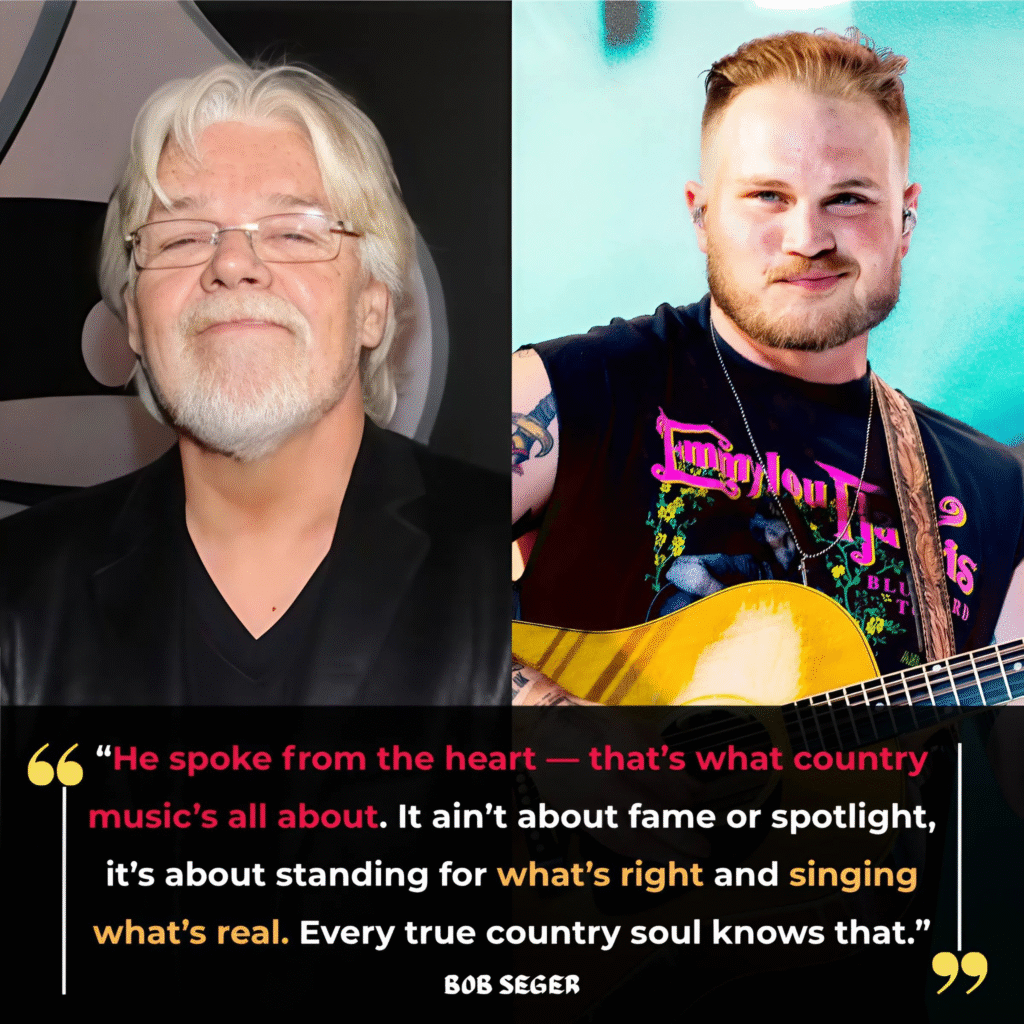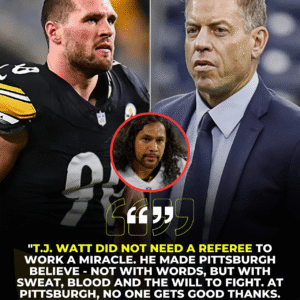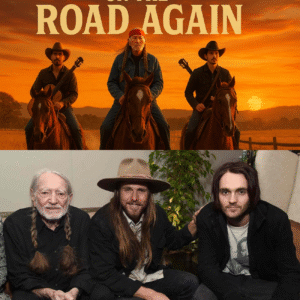
In an era where the music industry often seems more driven by trends than truth, one moment of solidarity has reminded fans what artistry — and authenticity — really mean.
This week, rock legend BOB SEGER publicly came to the defense of country star ZACH BRYAN, whose latest release, “Bad News,” stirred controversy across both mainstream media and social platforms. The song — a raw, emotionally charged reflection on modern disillusionment, faith, and personal struggle — has divided critics but struck a deep chord with working-class listeners.
For Seger, it wasn’t just about defending another musician. It was about defending the spirit of music itself.
“He spoke from the heart,” Seger said during a brief interview backstage after a charity concert in Detroit. “That’s what real music’s all about. It ain’t about trends, it’s about truth. And I’ve always believed that if you can’t sing your truth, you’re not really singing at all.”
The words carried the kind of weight only someone like Bob Seger could give them — an artist who’s spent more than five decades chronicling the heart of America in songs like “Against the Wind,” “Turn the Page,” and “Like a Rock.”
And just like those timeless ballads, Seger’s message wasn’t polished for headlines. It was simple, gritty, and heartfelt — exactly the kind of defense Zach Bryan needed at a time when his name was being dragged through digital mud.
A Controversy Born From Honesty
Zach Bryan’s “Bad News” dropped just two weeks ago, and almost instantly became one of the most talked-about releases of the year. The Oklahoma-born Navy veteran turned chart-topping artist has never shied away from blunt truth — and this track was no exception.
In the song, Bryan wrestles with the pressures of fame, the hypocrisy of public expectations, and the loneliness that comes with speaking out. One lyric in particular — “I’m tired of smiling for cameras that never see my soul” — drew sharp reactions online, with some critics accusing him of being “ungrateful” and “too dark” for country radio.
But among everyday fans, the reaction was very different. The comment sections flooded with messages of support:
- “Finally, someone says what we’re all feeling.”
- “Zach’s not complaining — he’s confessing. And that’s what makes it real.”
- “This song hits harder than anything Nashville’s put out in years.”
Then came Seger’s statement — a spark of reassurance from a man whose songs defined an entire generation of truth-tellers.

Bob Seger: The Working Man’s Philosopher
To understand why Seger’s defense meant so much, one has to understand what he stands for.
Bob Seger isn’t just a rock icon; he’s an American storyteller. His music has always carried the weight of ordinary lives — the long drives, the empty diners, the small-town heartbreaks, and the unstoppable resilience that defines the human spirit.
Throughout the 1970s and 1980s, Seger became the voice of blue-collar honesty. He wasn’t singing to please record executives. He was singing for truckers, factory workers, and dreamers who kept pushing “against the wind.”
So when Seger defends someone like Zach Bryan — an artist cut from that same unvarnished cloth — it feels less like a celebrity endorsement and more like a passing of the torch.
“Zach reminds me of a younger me in some ways,” Seger reflected. “He’s not afraid to write what hurts. And that’s rare now. You can’t teach that kind of honesty — it comes from living it.”
It’s that kind of lived experience that binds the two men together: both veterans of the road, both unfiltered in their lyrics, both misunderstood at times by the industry but deeply loved by those who still believe in real songwriting.
A Moment That Resonated Nationwide
Within hours of Seger’s comments, social media lit up. Hashtags like #StandTallZach and #SegerSavesCountry began trending on X (formerly Twitter), as fans and fellow musicians rallied behind Bryan.
One Nashville producer tweeted, “Bob Seger defending Zach Bryan is the crossover moment real music needed. Legends recognize legends.”
Country singer Cody Jinks posted a short but powerful message: “Truth never needs PR. Just courage.”
Even fans from outside the country and rock scenes joined the chorus. Indie musicians, truck drivers, military veterans, and everyday listeners flooded the internet with personal stories about how Bryan’s music — and Seger’s — had helped them through hard times.
It wasn’t just about one song anymore. It had become a conversation about integrity in modern music.
When the Industry Forgets What Matters
For years, critics have argued that mainstream music — whether country, rock, or pop — has drifted too far from its roots. Songs are often written by committees, designed for charts rather than hearts.
But Seger and Bryan stand as proof that the old ways — the honest ways — still matter.
Bryan, who records many of his songs live, often with minimal studio polish, has said repeatedly that he’d rather “sing in a barn for five people than fake it for fifty thousand.”
And Bob Seger? He’s long walked that same line. Despite enormous success, he famously turned down countless corporate endorsements throughout his career. He once told Rolling Stone, “Music’s sacred. Once you sell it for a soda commercial, it ain’t yours anymore.”
That belief — that music is meant to move souls, not products — is precisely what today’s industry often forgets. And it’s what makes this moment between Seger and Bryan so profound.
Two Generations, One Message
There’s something symbolic about seeing these two artists — one nearing eighty, the other barely thirty — standing shoulder to shoulder in spirit.
Different eras, different sounds, but the same heartbeat: truth.
Seger grew up on the gravel roads of Michigan; Bryan grew up in small-town Oklahoma. Both men know what it’s like to fight their way through silence, to turn pain into poetry.
Seger once sang, “Wish I didn’t know now what I didn’t know then,” — a line that speaks to every artist who’s seen too much of the industry machine. Bryan’s “Bad News” feels like a modern echo of that same sentiment.
They may sing in different styles, but they write from the same wound — and that’s what binds their music across generations.
Fans See More Than Fame — They See Themselves
When Seger’s defense went viral, fans didn’t just celebrate the gesture. They felt it.
In the comments under Seger’s Facebook post, one user wrote, “When a legend like Bob stands up for a young artist like Zach, it restores your faith that there’s still good left in this business.”
Another added, “Bob Seger defended every one of us who ever got told to shut up and play along. Thank you for reminding us that real art still matters.”
That’s the power of this moment. It wasn’t just artist-to-artist — it was human-to-human.
The Road Ahead
For Zach Bryan, this wave of support seems to have reignited his spirit. At a recent concert in Tulsa, he addressed the controversy briefly:
“I don’t write songs to be right. I write ’em to be real. And if that’s bad news to some folks, then I guess that’s just the news today.”
The crowd erupted in applause — not for defiance, but for honesty.
Meanwhile, Seger’s quiet words continue to ripple through the music world. Rumors have already begun circulating that the two artists may collaborate on a tribute project celebrating American storytelling in music. Neither side has confirmed it, but the idea alone has fans dreaming.
A Rare Reminder in a Noisy World
In today’s fast-scrolling, attention-hungry music industry, where headlines often outshine heartlines, the bond between Bob Seger and Zach Bryan feels revolutionary.
It’s a reminder that truth never goes out of style.
And perhaps most importantly, it’s a reminder that real music still has defenders — men like Bob Seger, who still believe that courage is louder than conformity.
“He spoke from the heart,” Seger said again, his voice steady and sure. “That’s what real music’s all about. Always has been. Always will be.”
For fans who grew up driving down empty highways with Seger’s songs on the radio — and for a new generation discovering Zach Bryan’s music on streaming apps — that’s a message worth turning up the volume for.
Because no matter how much the industry changes, truth will always find its melody.
And as Bob Seger once sang — “The fire inside never dies.”





